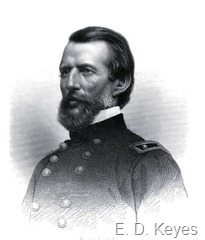Oak Haven, Oct. 3.—To get a house in V. proved impossible, so we agreed to part for a time till H. could find one. A friend recommended this quiet farm, six miles from —— (a station on the Jackson Railroad). On last Saturday H. came with me as far as Jackson and put me on the other train for the station.
On my way hither a lady, whom I judged to be a Confederate “blockade runner,” told me of the tricks resorted to to get things out of New Orleans, including this: A very large doll was emptied of its bran, filled with quinine, and elaborately dressed. When the owner’s trunk was opened, she declared with tears that the doll was for a poor crippled girl, and it was passed.
This farm of Mr. W.’s¹ is kept with about forty negroes. Mr. W., nearly sixty, is the only white man on it. He seems to have been wiser in the beginning than most others, and curtailed his cotton to make room for rye, rice, and corn. There is a large vegetable garden and orchard; he has bought plenty of stock for beef and mutton, and laid in a large supply of sugar. He must also have plenty of ammunition, for a man is kept hunting and supplies the table with delicious wild turkeys and other game. There is abundance of milk and butter, hives for honey, and no end of pigs. Chickens seem to be kept like game in parks, for I never see any, but the hunter shoots them, and eggs are plentiful. We have chicken for breakfast, dinner, and supper, fried, stewed, broiled, and in soup, and there is a family of ten. Luckily I never tire of it. They make starch out of corn-meal by washing the meal repeatedly, pouring off the water and drying the sediment. Truly the uses of corn in the Confederacy are varied. It makes coffee, beer, whisky, starch, cake, bread. The only privations here are the lack of coffee, tea, salt, matches, and good candles. Mr. W. is now having the dirt-floor of his smoke-house dug up and boiling from it the salt that has dripped into it for years. To-day Mrs. W. made tea out of dried blackberry leaves, but no one liked it. The beds, made out of equal parts of cotton and corn-shucks, are the most elastic I ever slept in. The servants are dressed in gray homespun. Hester, the chambermaid, has a gray gown so pretty that I covet one like it. Mrs. W. is now arranging dyes for the thread to be woven into dresses for herself and the girls. Sometimes her hands are a curiosity.
The school at the nearest town is broken up and Mrs. W. says the children are growing up heathens. Mr. W. has offered me a liberal price to give the children lessons in English and French, and I have accepted transiently.
![]()
______
¹On this plantation, and in this domestic circle, I myself afterward sojourned, and from them enlisted in the Confederate army. The initials are fictitious, but the description is perfect.—G.W.C. (the editor of the published diary, George Washington Cable.)
Note: To protect Mrs. Miller’s job as a teacher in New Orleans, the diary was published anonymously, edited by G. W. Cable, names were changed and initials were often used instead of full names — and even the initials differed from the real person’s initials.


